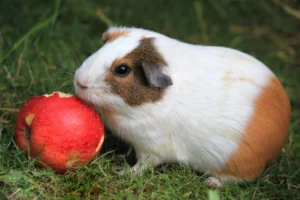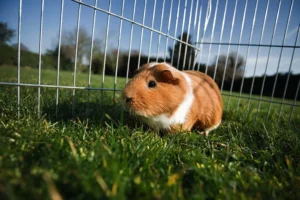Guinea pigs are beloved pets known for their gentle nature and their delightful squeaks that can bring joy to any household.
As responsible pet owners, it’s crucial to provide them with a well-balanced diet that includes a variety of fruits and vegetables.

Apples, being a common household fruit, may seem like a tasty treat to share with your furry friend, but before you hand over a slice, it’s essential to understand the ins and outs of feeding apples to guinea pigs.
Are Apples Good for Guinea Pigs?
Apples can be a healthy and tasty addition to your guinea pig’s diet when given in moderation.
They are a good source of vitamin C, which is crucial for your guinea pig’s overall health. Vitamin C helps boost the immune system, aids in the absorption of iron, and promotes healthy skin and fur.
However, it’s important to remember that guinea pigs produce little to no vitamin C on their own, making it vital to supplement their diet with vitamin C-rich foods like apples.
Can Guinea Pigs Eat Apple Skin?
Yes, guinea pigs can eat apple skin. In fact, apple skin contains fiber, which is essential for proper digestion in guinea pigs.
The fiber content helps maintain a healthy gut and can prevent issues such as constipation.
Before offering apple slices, be sure to wash the apple thoroughly to remove any pesticides or contaminants.
Can Guinea Pigs Eat Apple Seeds?
While guinea pigs can technically eat apple seeds, it’s advisable to remove them before serving.
Apple seeds contain cyanide, albeit in small amounts.
While a few seeds are unlikely to harm your guinea pig, it’s best to err on the side of caution and eliminate the risk altogether.
Can Guinea Pigs Eat Apple Core?
Guinea pigs can nibble on apple cores, but it’s crucial to remove the seeds as mentioned earlier.
The core itself is safe for guinea pigs to eat in moderation, but it’s essential to cut it into small, manageable pieces to prevent choking hazards.
Can Guinea Pigs Eat Apple Sauce?
Feeding apple sauce to guinea pigs is not recommended.
Commercially available apple sauce often contains added sugars, preservatives, and other ingredients that may not be suitable for guinea pig consumption.
Stick to fresh, raw apples to ensure your guinea pig receives the maximum nutritional benefit.
Can Guinea Pigs Eat Apple Pie?
While the idea of sharing a slice of apple pie with your guinea pig might seem tempting, it’s best to avoid it.
Most apple pies contain ingredients like sugar, butter, and flour that are not suitable for guinea pig consumption.
Stick to fresh apples for a safe and healthy treat.
Should I Feed Apples to My Guinea Pigs?
Yes, you can feed apples to your guinea pigs, but it should be done in moderation.
Apples should be treated as a treat rather than a primary food source.
A small slice a few times a week is sufficient to provide the necessary nutrients without overloading your guinea pig’s system.
How Much Apple Can I Give My Guinea Pig to Eat?
A suitable serving size for a guinea pig is a small slice or two, a few times a week.
Remember, moderation is key. Overfeeding can lead to digestive issues or weight problems, so it’s crucial to maintain a balanced diet.
What Happens if a Guinea Pig Eats Too Much Apple?
If a guinea pig consumes too much apple, it can lead to digestive problems such as diarrhea or upset stomach.
The high sugar content in apples can be problematic if ingested excessively.
If you notice any changes in your guinea pig’s behavior or stool after introducing apples to their diet, consult with a veterinarian.
What Are the Nutrients in an Apple?
Apples are a good source of essential nutrients, including vitamin C, fiber, and antioxidants.
These nutrients contribute to your guinea pig’s overall well-being, supporting their immune system and digestive health.
What Is a Healthy Guinea Pig Diet?
A healthy guinea pig diet should consist of fresh hay, high-quality pellets, and a variety of fresh vegetables and fruits.
Ensure a balance of nutrients, and always introduce new foods gradually to monitor your guinea pig’s reaction.
What Should I Know About Apples?
When offering apples to your guinea pig, choose organic if possible to minimize pesticide exposure.
Always wash the apple thoroughly, cut it into small, manageable pieces, and remove the seeds and core.
Remember, variety is key in a guinea pig’s diet, so rotate their treats to keep their diet interesting and nutritionally diverse.
What Apples Are Harmful to Guinea Pigs?
While most apple varieties are safe for guinea pigs, it’s essential to avoid feeding them spoiled or moldy apples.
Mold can be harmful and lead to digestive issues.
Stick to fresh, crisp apples to ensure the health and well-being of your furry friend.
Foods to Avoid
While apples can be a delightful addition to your guinea pig’s diet, not all foods are safe for them.
To ensure the well-being of your furry friend, it’s crucial to be aware of foods that should be avoided:
- Citrus Fruits: Guinea pigs do not produce their own vitamin C, but citrus fruits like oranges and lemons can be too acidic for their sensitive digestive systems.
These fruits may lead to stomach upset and mouth sores. - Onions and Garlic: These vegetables contain compounds that can be harmful to guinea pigs and may cause digestive issues.
It’s best to steer clear of any foods that belong to the Allium family. - Iceberg Lettuce: While other leafy greens are excellent for guinea pigs, iceberg lettuce is mostly water with minimal nutritional value.
Feeding it in excess can lead to diarrhea and dehydration. - Chocolate and Sweets: Chocolate contains theobromine, which is toxic to guinea pigs.
Additionally, sugary treats can contribute to obesity and dental problems.
Always avoid giving your guinea pig any sweets or chocolate. - Potatoes: Raw potatoes and potato peels contain harmful substances that can be detrimental to your guinea pig’s health.
Cooking removes some of these toxins, but it’s safer to avoid potatoes altogether. - Avocado: Avocado contains a substance called persin, which can be toxic to guinea pigs.
Even a small amount can lead to digestive issues, difficulty breathing, and, in severe cases, heart failure. - Cabbage and Brussels Sprouts: While these vegetables are rich in nutrients, they can cause gas and bloating in guinea pigs.
Small amounts are generally okay, but excessive consumption may lead to digestive discomfort. - Nuts and Seeds: Nuts and seeds are high in fat, which can lead to obesity and other health issues in guinea pigs.
Additionally, some nuts, like almonds, contain substances that can be harmful. - Dairy Products: Guinea pigs are lactose intolerant, so dairy products should be avoided.
Feeding them can result in digestive upset and diarrhea. - Human Snacks and Processed Foods: Chips, crackers, and other processed snacks are high in salt, sugar, and unhealthy fats, which are not suitable for guinea pigs.
Stick to fresh, natural foods for their snacks. - Alcohol: Alcoholic beverages are toxic to guinea pigs and can cause severe health issues, including organ failure. Keep all alcoholic substances away from your pets.
Final Thoughts:
In conclusion, guinea pigs can enjoy the occasional apple slice as a tasty and nutritious treat. Remember to remove seeds and core, wash the apple thoroughly, and feed in moderation.
By incorporating apples responsibly into your guinea pig’s diet, you can contribute to their overall health and happiness.
As always, if you have any concerns or questions about your guinea pig’s diet, consult with a veterinarian for personalized advice.



